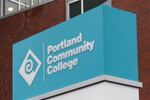The COVID-19 pandemic intensified a trend of falling enrollment at Oregon’s community colleges. At Oregon’s largest institution of higher education — Portland Community College — enrollment fell by 23% from before the pandemic to last fall, according to data from the Higher Education Coordinating Commission. But, community colleges continue to look for ways to attract and retain students, particularly underrepresented students — and PCC is seeing evidence that a program it’s supported for years is paying off.
Future Connect, a scholarship and support program at PCC has served more than 3,600 low-income and first-generation college students in the Portland area. Students, alumni and college and community leaders celebrated the 10th anniversary of PCC’s Future Connect Program this month.

A Portland Community College sign is pictured in Portland, Ore., May 16, 2016.
Bryan M. Vance / OPB
“We know that the Future Connect approach helps first-generation, low-income students — and the majority of our students have been students of color — to graduate at higher rates, to acquire more credits, to get on track, persist at higher rates than peers,” PCC President Mark Mitsui told OPB.
Future Connect offers both scholarship money and support, including career guidance and personalized advising, to low-income students or students who are the first in their families to go to college from Multnomah County, Hillsboro and Beaverton.
Mitsui considers the program “a model for public-private partnerships.” When the program launched a decade ago, it had support from the City of Portland, donations through the PCC Foundation and investment from the college itself. Now those partnerships have grown to include the cities of Beaverton and Hillsboro. Leaders of nonprofits and businesses, including Meyer Memorial Trust and Hillsboro Aviation, have also supported the program, according to the PCC Foundation.
“It’s grown from I think 100 initial students to now annually 300 new students per year,” Mitsui said.
A 2017 report from the Portland nonprofit Education Northwest found Future Connect had a “substantial impact” on students’ academic outcomes, including higher grade point averages and completion and transfer rates.
“As economic inequities grow in the United States, programs like Future Connect provide potential models of how we can achieve more equitable postsecondary outcomes for low-income and first-generation college students by providing relationship-based, student-centered and holistic support,” the report reads.
Along with scholarship money and personal advising, Future Connect helps students with their next steps on their college or career paths, such as assisting with internships and navigating the transfer process if they want to pursue degrees beyond an Associate’s.
Although the program has grown substantially in the past decade, Mitsui said it still doesn’t have the capacity to serve every student who applies.
“The need far exceeds our funding,” he said. “I think the ratio is something like for every student we take in, there are nine more who have applied. The demand is there.”

